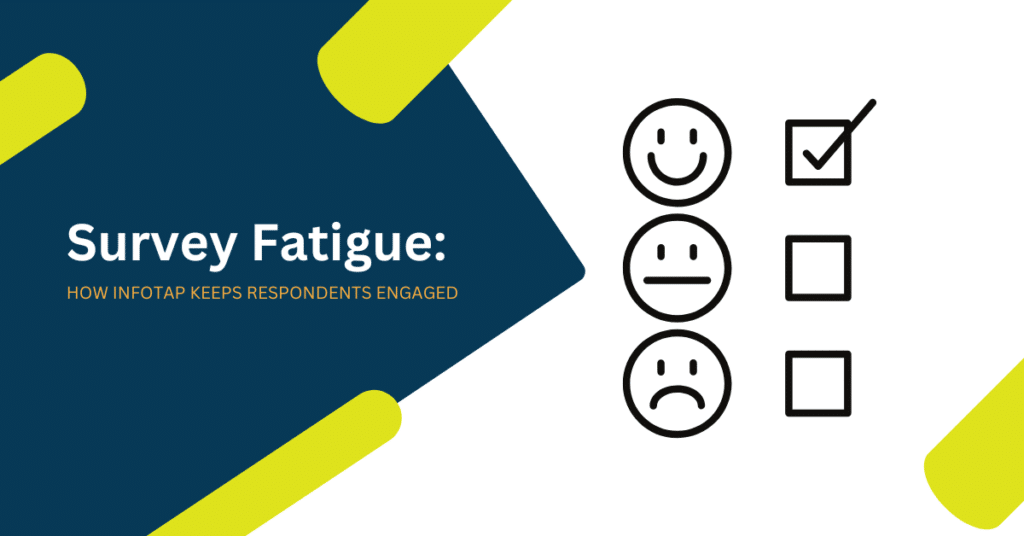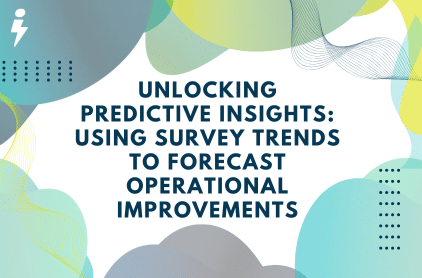
Table of Contents
Survey fatigue is a persistent challenge for businesses, researchers, and organizations that rely on data collection through surveys. With the growing demand for feedback and insights, the number of surveys that consumers and employees are asked to complete has skyrocketed. However, this has led to a phenomenon known as survey fatigue, where respondents become disinterested and disengaged, resulting in lower completion rates and reduced response quality.
Survey fatigue significantly impacts the quality of data gathered, undermining the value of the insights collected. Participants faced with long, repetitive, or poorly designed surveys tend to either abandon the survey or provide quick, unconsidered responses. This directly affects the reliability of data and can lead to misleading conclusions.
Infotap addresses this challenge head-on. As a platform designed to combat survey fatigue, Infotap helps keep respondents engaged through user-friendly design, short and focused surveys, engaging question formats, personalization, mobile optimization, and post-survey feedback mechanisms. In this blog, we’ll explore the concept of survey fatigue, its impact on data collection, and how Infotap’s features work together to enhance the survey experience and improve response rates.
Understanding Survey Fatigue
Survey fatigue occurs when respondents feel overwhelmed or uninterested in completing a survey. This can happen due to the length of the survey, the complexity of the questions, or a lack of engagement. When respondents experience fatigue, their responses may become careless, rushed, or incomplete. In some cases, they may abandon the survey entirely.
The Impact of Survey Fatigue on Data Quality
Survey fatigue affects the quality and reliability of the data collected. Respondents who experience fatigue are more likely to provide incomplete or inaccurate responses. The consequences can be profound, including:
- Low Completion Rates: Fatigued respondents are more likely to abandon surveys midway. Research shows that long surveys experience significantly higher dropout rates. According to industry studies, 40% of respondents stop participating after 10 minutes, and response rates drop sharply after the 15th question.
- Inaccurate Data: When respondents lose interest in a survey, they often provide hasty or inaccurate responses, leading to unreliable data that may not reflect true opinions or behaviors.
- Decreased Response Quality: Survey fatigue can result in “straight-lining,” where respondents give the same answer repeatedly just to finish the survey. This behavior significantly reduces the value of the data collected.
Statistics on Survey Fatigue
Survey fatigue is a widespread issue across industries:
- 75% of respondents report that they abandon surveys because they are too long.
- Surveys that exceed 10 minutes see completion rates drop by an average of 20%.
- Respondents report significantly higher satisfaction with surveys that are under 2 minutes in length or contain fewer than 10 questions.
Common Causes of Survey Fatigue
- Lengthy Surveys: Respondents are more likely to disengage from long surveys. The longer the survey, the more likely participants will abandon it before completion. Overly long surveys require significant time commitments, which many participants are unwilling to make, particularly when faced with multiple surveys.
- Complex or Confusing Questions: Survey questions that are overly complex or poorly worded contribute to cognitive overload. When respondents struggle to understand the questions, their frustration increases, leading to disengagement.
- Lack of Engagement: Monotonous, repetitive questions fail to maintain respondent interest. Surveys that offer no variation or interaction tend to lose participants’ attention.
- Irrelevance: When respondents encounter questions that don’t apply to their experiences or interests, they become frustrated. A lack of personalized or targeted questions leads to higher dropout rates.
To tackle these issues, survey platforms need to focus on creating engaging, relevant, and concise surveys. Infotap has made this the foundation of its platform.
Infotap has developed a range of tools and strategies to reduce survey fatigue, ensuring that surveys remain engaging and manageable for respondents. These features allow organizations to gather meaningful, high-quality data without overwhelming their participants.
User-Friendly Design
Infotap places a strong emphasis on providing an intuitive, visually appealing interface that simplifies the survey experience for respondents. When surveys are easy to navigate and understand, respondents are more likely to complete them and provide thoughtful answers.
- Intuitive Navigation: Infotap’s surveys are designed with clear and simple navigation tools that guide participants smoothly through each question. Respondents don’t have to waste time figuring out how to proceed, which reduces frustration and abandonment.
- Clear Instructions: Confusing instructions are a major contributor to survey fatigue. Infotap ensures that all questions are accompanied by clear, concise instructions that make it easy for respondents to understand what is being asked of them.
- Visually Appealing Layouts: Infotap’s interface is designed to minimize cognitive overload. By incorporating clean, uncluttered layouts with ample white space and a simple design aesthetic, Infotap reduces the mental effort required to complete a survey.
A user-friendly design is a critical element in keeping respondents engaged. Surveys that are difficult to navigate or visually unappealing are more likely to cause frustration, leading to higher dropout rates and lower-quality responses.
Short and Concise Surveys
A key recommendation from Infotap is to keep surveys under 10 questions and to aim for a 2-minute completion time. This approach ensures that surveys remain manageable for respondents and prevents fatigue from setting in.
- Optimal Survey Length: Research has consistently shown that shorter surveys lead to higher completion rates. Infotap advises survey creators to limit the number of questions and focus on only the most important aspects of the survey. Keeping surveys concise prevents respondents from feeling overwhelmed and helps maintain their attention.
- Focused Questions: Infotap encourages survey creators to ask focused, direct questions that elicit the necessary information without redundant or irrelevant queries. By cutting out unnecessary questions, survey creators can increase the likelihood of respondents completing the entire survey.
- Improved Completion Rates: Studies have shown that surveys with fewer than 10 questions experience a 30-40% higher completion rate compared to longer surveys. Additionally, keeping the estimated time to under 2 minutes reduces the likelihood of respondents dropping out halfway through.
By keeping surveys brief and targeted, Infotap maximizes response rates and ensures higher-quality data.
Engaging Question Formats
Infotap offers a range of question formats to keep respondents engaged throughout the survey. By varying the types of questions, Infotap ensures that respondents remain interested and motivated to provide thoughtful answers.
- Multiple-Choice Questions: Multiple-choice questions are quick and easy for respondents to answer, making them an effective way to gather information without causing fatigue. Infotap’s clean and simple multiple-choice layout ensures that respondents can provide answers quickly, without unnecessary complexity.
- Rating Scales: Rating scales allow respondents to indicate the degree to which they agree or disagree with a statement. These questions are effective for gauging opinions and attitudes in a structured format, and Infotap’s implementation of Likert scales makes it easy for respondents to provide feedback without feeling overwhelmed.
- Open-Ended Questions: While open-ended questions can provide valuable insights, they can also contribute to fatigue if overused. Infotap offers question formats that can offer up to 9 different answer options, giving the respondents options that will align with their opinion. This prevents respondents from feeling burdened by the need to provide long, detailed responses for every question.
- Visual and Interactive Elements: Infotap incorporates visual elements, such as sliders or drag-and-drop questions, which break up the monotony of traditional text-based questions. These interactive elements make the survey experience more dynamic, encouraging respondents to stay engaged.
By offering a variety of question formats, Infotap ensures that surveys are engaging and diverse, which helps keep respondents focused and interested throughout the process.
Personalization and Relevance
One of the most effective ways to reduce survey fatigue is by ensuring that surveys are relevant and personalized to the respondent. When respondents encounter questions that are tailored to their demographics or past interactions, they are more likely to remain engaged.
- Customized Survey Paths: Infotap allows survey creators to tailor questions based on respondents’ previous answers. For example, if a respondent indicates that they don’t use a particular product, Infotap can automatically skip any questions related to that product. This ensures that respondents aren’t burdened with irrelevant questions, improving engagement and reducing frustration.
- Targeted Content: Infotap’s platform enables survey creators to customize questions based on demographic information, such as age, location, or job role. By ensuring that respondents only see questions that are relevant to them, Infotap increases the likelihood of receiving thoughtful and accurate responses.
- Improved Engagement Rates: Surveys that are personalized to the respondent’s experience have been shown to increase engagement rates by 25%. When participants feel that a survey is directly relevant to their lives, they are more likely to take the time to provide high-quality responses.
Personalization not only helps combat survey fatigue, but it also improves the overall quality of the data collected.
Mobile Optimization
With more respondents accessing surveys on mobile devices, it is crucial that surveys are optimized for mobile use. Infotap places a strong emphasis on ensuring that all surveys are fully responsive and mobile-friendly.
- Mobile-First Design: Infotap’s surveys are designed to work seamlessly on mobile devices. The platform automatically adjusts the survey layout to fit the screen size, ensuring that respondents can easily complete the survey on any device, whether they are using a smartphone, tablet, or computer.
- Touch-Friendly Interface: Infotap’s mobile surveys feature large, easy-to-tap buttons and touch-friendly sliders, making it simple for respondents to answer questions on the go. This reduces frustration and helps keep respondents engaged.
- Wider Reach: Mobile optimization ensures that survey creators can reach a broader audience. With 60% of surveys now being completed on mobile devices, having a mobile-friendly platform is essential for maximizing engagement and response rates.
By prioritizing mobile optimization, Infotap ensures that respondents can complete surveys whenever and wherever it is most convenient for them, leading to higher completion rates and more accurate data.
Follow-Up and Feedback
Infotap doesn’t just stop at collecting responses; it also allows for post-survey feedback to improve future surveys and keep respondents engaged for the long term.
- Post-Survey Feedback: After completing a survey, Infotap can ask respondents to provide feedback on the survey itself. This allows survey creators to identify any areas of the survey that may have caused frustration or confusion and make improvements for future surveys.
- Showing Impact: Infotap also emphasizes the importance of showing respondents how their feedback is being used. By demonstrating how their input has led to real-world changes, Infotap builds trust and encourages respondents to participate in future surveys.
- Ongoing Engagement: Respondents who feel that their opinions are valued and acted upon are more likely to engage with future surveys. Infotap’s feedback mechanisms foster a positive relationship with participants, leading to higher response rates over time.
By maintaining an ongoing dialogue with respondents, Infotap helps ensure that participants feel valued and engaged, which leads to more accurate and thoughtful data collection.
Measuring Engagement and Success
To ensure the success of its strategies, Infotap provides detailed analytics that allow survey creators to measure engagement and track the effectiveness of their surveys.
- Completion Rates: Infotap tracks the percentage of respondents who complete the survey, providing insight into how well the survey is engaging participants. Surveys that use Infotap’s fatigue-reducing features consistently see higher completion rates.
- Drop-Off Points: Infotap identifies where respondents are most likely to abandon the survey. This allows survey creators to adjust questions or restructure the survey to minimize drop-off rates.
- Response Quality: Infotap also tracks the quality of responses, helping survey creators determine whether respondents are providing thoughtful answers or simply rushing through the survey. Higher-quality responses indicate that participants are engaged and not experiencing fatigue.
These metrics help survey creators continuously improve their surveys, ensuring that they are optimizing for both engagement and data quality.
Conclusion
Survey fatigue is a significant challenge that can undermine the accuracy and value of data collection. However, Infotap offers a powerful solution by addressing the common causes of fatigue through its user-friendly design, concise surveys, engaging question formats, personalization, mobile optimization, and post-survey feedback tools.
By keeping respondents engaged and minimizing the burden of participation, Infotap helps organizations gather high-quality, actionable data while ensuring that respondents have a positive experience. For anyone looking to improve survey completion rates and collect meaningful insights, Infotap provides the tools and strategies necessary to reduce survey fatigue and enhance engagement.
Ready to reduce survey fatigue and improve the quality of your data? Schedule a demo and discover how its innovative features can help you create engaging, relevant surveys that keep respondents motivated from start to finish. Experience the benefits of higher completion rates and more reliable insights for your next survey project.







